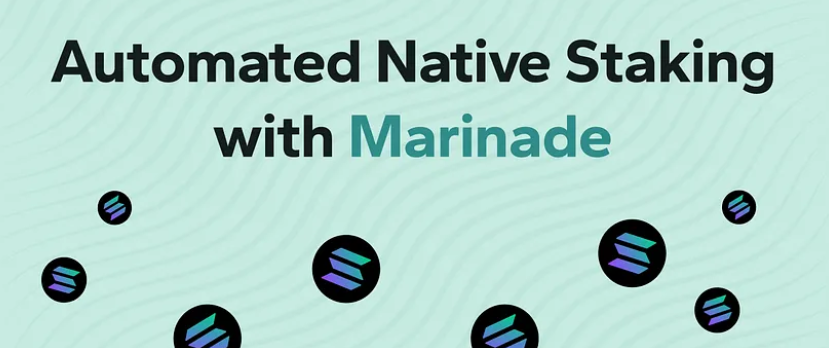- For the first time, Marinade is offering its smart, automated delegation strategy to native SOL stakers with Marinade Native.
- Marinade’s stake delegation formula is automatically updated each epoch and is determined using a scoring system combining decentralization and performance.
- Any SOL staker can utilize Marinade Native, including those with locked SOL from grants or early investment.
Solana is among the most popular blockchains to stake on, with ~70% of all SOL tokens currently staked (over $9 billion in staked value).
There is also a robust validator network: 2,000+ strong ranging from major institutions operating nodes like Coinbase and a16z, to NFT and DeFi projects validating transactions on the network they operate. Individuals and independent small teams also operate nodes. At the moment, staking reward yields, distributed by Solana blockchain emissions each epoch (2–3 days), are over 7% annually. (Solana’s proposed inflation schedule slowly decreases SOL emissions over the coming years, ultimately to 1.5% per year, as the blockchain matures.)
Furthermore, the concept of stake pools has been live on Solana for nearly two years. When Marinade launched in August 2021, the protocol introduced two value propositions to Solana stakers:
- Liquidity for your staked SOL via the mSOL liquid staking token.
- A permissionless, algorithmic stake delegation strategy.
Until now, stakers had to liquid stake to enjoy the delegation strategy.
But with Marinade Native, any staker can utilize a non-custodial, automated stake management to 100+ high-performing validators without any smart-contract interaction.
Risks of Solana staking
Staking SOL natively is non-custodial with no smart contract exposure. Stakers delegate their tokens to a validator, and these tokens are applied as a weight that enables the validator to be the slot leader more often, which then verifies transactions and by doing so, receives rewards.
As a new staker, you might be tempted to simply look up the highest APY validator on SolanaCompass or in a wallet, or a 0% commission validator, and stake all your SOL to that node.
After all, it’s the highest-performing node with no fees, right?
It’s not that simple. Staking all your SOL to one validator means your rewards will be determined by a single node’s performance. Staking risks include:
- Commission rugging
- Offline time
- Server suspensions
- Forked Validators
- Liquid staking: Smart contract exposure
- Staking through a central exchange
- Slashing (coming soon)
Commission Rugging
A validator’s displayed commission isn’t always the full story. Marinade has been developing tools to identify bad behavior from validators, and one of the most common methods, often undetected, is “commission rugging.” This practice, in which a validator keeps all the staking rewards instead of distributing them to their stakers, has increased since late 2022 around the time of the FTX collapse and subsequent rapid decrease in SOL price which affected validator profitability.
Here’s how “commission rugging” works:
- A validator promotes a competitive commission of 0–10%, attracting stake to it.
- But hours before the epoch boundary, they change their commission to 100%
- The rewards are distributed by the chain, and the validator keeps all of it.
- Shortly into the new epoch, changes the commission back. If the staker isn’t checking, they don’t even know they’re not receiving rewards.
In epoch 473, Marinade identified 20 validators (~1% of all nodes), that rugged their commissions in this way. While there are steps Solana could take to make this behavior impossible, and Marinade blacklists these validators from ever receiving stake, for the time being, it is a major risk for new stakers unaware of this practice.
Since epoch 378, (Nov 27, 2022), Marinade has identified 165 validators “rugging” commission at the epoch boundaries, roughly 8% of all validators on Solana.
Offline time
All validators must go offline at some point to perform upgrades or maintenance. But these outages should be brief. If the validator isn’t actively monitoring their node, an unexpected issue could cause an outage and extended downtime that causes them to miss out on leading slots and lose staking rewards.
282 Solana validators comprised of nearly 20 million SOL stake were down for at least an hour in epoch 473. 483 validators were down for at least 30 minutes, accounting for over 34 million SOL stake. This means 20–25% of all validators had noticeable downtime in this epoch long enough to threaten performance.
Server suspensions: The Hetzner event
In November 2022, German cloud server provider Hetzner abruptly shut down the service of all Solana validators, upwards of 1,000 total nodes. This accounted for 22% of Solana's stake going offline (according to Rockaway infrastructure). The blockchain continued to process blocks as normal. But this outage forced affected validators to relocate quickly, and many SOL stakers had to move their stake. That is if they noticed the outage at all.
For days, weeks, and even months after the outage, many stakers left their SOL with these delinquent validators, unaware of any disruption.
Hetzner cloud server performance was near the bare minimum required to operate a validator on Solana. So even though so many validators used it, their performance typically did not meet the minimum requirements to receive any Marinade delegation. While 22% of Solana’s stake went offline when the Hetzner outage occurred, only 1% of Marinade’s stake was Hetzner, thus causing minimal impact on the staking APY of the pool.
The Hetnzer outage was the largest example of validators going offline for an extended period. Sometimes, these validators make announcements, alerting their stakers to move their SOL. Other times, they cease operations without any notice.
In fact, as of epoch 473, over 1 million SOL was staked with validators who were having extended offline time. Not only could this stake be generating rewards for the SOL stakers, but it could also be contributing to the further decentralization of Solana.
Forked validators
Another scenario that stakers should be aware of is when validators are forked from the network for their failure to update to the minimum required Solana version. Most recently this happened in July as a handful of validators did not update to 1.14.18 before the cutoff in Epoch 480. This resulted in the fork of nine validators, which comprised nearly 1M SOL staked. Stakers of these nodes are not only no longer contributing to the security of the network, but also no longer receiving any staking rewards.
Marinade’s tooling is constantly monitoring these issues and warning validators and stakers of the impact, as well as rebalancing their delegation strategy to ensure only eligible and high-scoring validators are included in the algorithm.
In early 2023, Marinade revamped its delegation strategy to be even more performant, staking to the best 100 validators based on a score combining performance and decentralization metrics. Read about the Marinade Delegation Strategy details in the docs.
Liquid staking: Smart-contract exposure
Unlike native staking which is non-custodial, liquid staking on Solana requires interacting with a smart contract. Users deposit SOL into Marinade’s smart contract in order to have several key functions of liquid staking performed, such as:
- Determining the user’s share of the stake pool rewards
- Updating the “true” mSOL/SOL price each epoch based on stake rewards received
- Directing management fees from the stake pool to the Marinade treasury
- Completing the unstaking process by burning mSOL and returning SOL to the user’s wallet
And with the primary benefit of mSOL being the liquid staking token available for use in DeFi, when you use mSOL in other DeFI protocols, you introduce an additional layer of smart contract exposure. Vaults or other advanced DeFi strategies can rely on oracles or other external data points that introduce more surface area for failure or exploitation.
Marinade Native introduced the possibility of utilizing its stake bot to create stake accounts on behalf of the user without requiring any exposure to the stake pool smart contract. Therefore, stakers can now utilize the automatically risk-adjusted and updated features of Marinade’s delegation strategy without the DeFi risk, if they so choose. Returns on Marinade Native will be comparable to liquid staking, except Native will carry no 6% management fee. Liquid stakers, however, can theoretically achieve additional opportunities in DeFi, like lend-borrow or liquidity providing, through their unlocked, collateralized SOL as mSOL. Visit The DeFi Cookbook to browse 14 different strategies using mSOL
Staking through a central exchange
Many central exchanges offer the staking of various assets to their users. Several even operate their own Solana validators (like Kraken and Binance). Staking with a centralized entity may not provide the staker on-chain confirmation of the action, so it may be unclear what exactly is happening with the SOL as it’s staked. There has also been some regulatory scrutiny in the U.S., causing Kraken to suspend SOL staking to U.S. customers in February, and Coinbase suspended staking services in four U.S. states.
CEX’s may also have extended locking periods to offer a higher APY. Otherwise, they may also keep more rewards to cover their service, so APY may be lower than staking directly through Marinade or validator websites.
Many CEX’s are large and influential, and how they choose to stake their can have a large impact on decentralization, which as centralized entities, may not be their priority.
Slashing on Solana: Coming soon?
Slashing is a potential future risk for staking on Solana. Though not implemented yet, it is a fundamental element of ensuring proof-of-stake networks remain reliable. Slashing is a term that means that if a validator acts nefariously, the validator community could vote to slash some of their SOL (burn it) as a penalty. Slashing impacts both the validator and their stakers. This mechanism is meant to serve as a significant deterrent for any validator with ill intent or negligence and punish stakers who might support them.
Marinade maintains an epoch-by-epoch history of validator performance which will enable them to stake to the most trustworthy in the network, and because the stake is distributed to so many nodes, even in the event of slashing, any loss of SOL would be minimal through Marinade.
How Marinade automatically manages your SOL stake
Marinade Native was designed to put your stake at ease by automatically managing your stake while leaving you full custody of your SOL. Here’s how:
Solana’s core code decouples withdrawal and stake authorities. So stakers can authorize another party to manage their stake delegation while keeping full custody of their withdrawal authority and tokens. Upon being granted Stake Authority, Marinade automatically manages the staking operations on behalf of the staker, including splitting, merging, and restaking (Marinade covers these transaction costs).
There is a lot of rebalancing happening each epoch, so in order to ensure the pool continues to generate sufficient rewards, only 1% of a staker’s total SOL stake is rebalanced at any given point. However, when Solana mainnet’s new “redelegate” feature is released later in 2023, this will enable stakers, including the Marinade Native stake bot, to redelegate without having to warm up or cool down stake.
On the back end, this requires many stake accounts to be created in order to reflect every validator in the delegation. From your wallet like Phantom, you will see each stake account individually created in your staking tab. But with Marinade’s new user-friendly dashboard, it will look as simple to the user as staking with one validator.
Stakers may revoke this authority from Marinade at any time and claim their SOL.
Get started with Marinade Native
Unlocking the power of Marinade’s automated delegation strategy is easy, whether you have 1 SOL or much more. Accounts with SOL vesting in locked accounts can also take advantage of Marinade Native by visiting the Marinade DApp.
Steps to stake with Marinade (Native or mSOL)
- Visit app
- Connect wallet
- Click on “Starting Earning SOL Now”
- Select between “Liquid” or “Native Stake”
- For liquid staking, you can vote to direct your stake to a validator or use the Marinade strategy
- For Native Staking, keep the delegation strategy on Automatic.
- Once you stake to the “Native” and “automatic” strategy, Marinade will begin creating stake accounts for all the validators in the current delegation strategy (min. 1 SOL per validator). Each epoch, as validator scores are adjusted, the stake bot will automatically adjust delegation.
Unstaking from Marinade Native
When you’re ready to unstake, return to the Marinade DApp to perform a single transaction, and the Marinade bot will merge your stake accounts and unstake the SOL for you. As long as your Marinade Native stake is unstaked about 4 hours prior to the next epoch, it will be ready at the beginning of the next epoch.
How to convert your native SOL stake to mSOL
Once the stake is active, you may want to convert a portion of this into mSOL to take advantage of a DeFi opportunity. There is no need to unstake, as Marinade will do this instantly. Simply click on your Native position and “redelegate” and you will be able to receive mSOL instantly for use in DeFi.
 English
English
 Deutsch
Deutsch
 Español
Español
 Français
Français
 Português
Português
 日本
日本
 한국인
한국인
 Türkçe
Türkçe
 Русский
Русский
 Tiếng Việt
Tiếng Việt














